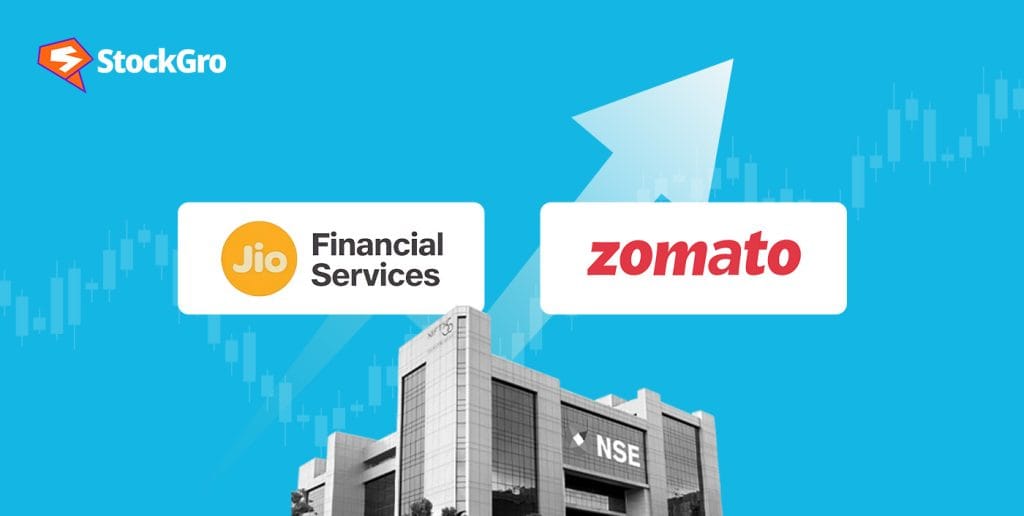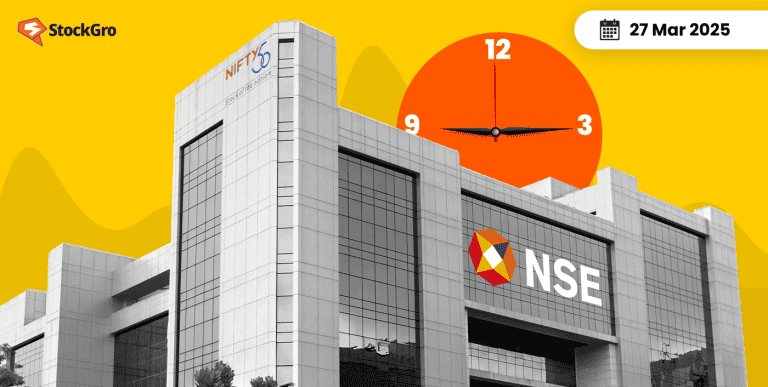
Just a few years ago, Zomato was best known for bringing your dinner to your doorstep. And Jio Financial? A relatively new player spun off from India’s telecom giant Reliance. But on March 28, 2025, both companies will enter the Nifty 50, India’s most tracked stock market index.
The inclusion isn’t just symbolic. It sets off a chain reaction of fund flows, passive investments, and market reshuffling that could impact how portfolios are managed across India. Let’s break it down simply.
What’s the Nifty 50 reshuffle all about?
Every six months, NSE Indices rebalances the Nifty 50 — a list of the 50 biggest and most liquid companies listed on the National Stock Exchange. This time, Zomato and Jio Financial Services are stepping in, while BPCL and Britannia are stepping out.
The rejig takes effect from March 28, 2025, with adjustments based on the close of trade on March 27, 2025. But traders and investors have already started adjusting their positions.
Also read: Trump’s new auto tariffs impact explained
Why are these stocks rallying?
Because index inclusion brings passive fund inflows.
Let’s say you’re an exchange-traded fund (ETF) tracking the Nifty 50. When the index adds Zomato and Jio Financial, you’re automatically required to buy their shares — even if you didn’t intend to. The same applies to mutual funds and pension funds that track the index.
Here’s a look at the expected inflows and outflows:
| Stock | Action | Expected Inflow/Outflow (₹ Cr) |
| Zomato | Inclusion | ₹5,182.7 Cr |
| Jio Financial Services | Inclusion | ₹2,651.6 Cr |
| BPCL | Exclusion | ₹1,937 Cr outflow |
| Britannia Industries | Exclusion | ₹2,048.96 Cr outflow |
Together, Zomato and Jio Financial are expected to bring in ₹7,834.29 crore into the index.
How are the stock prices reacting?
In early trade on March 27:
- Zomato touched a high of ₹208.75, up 2.68%, and closed around ₹205.00 (0.84% up).
- Jio Financial Services hit ₹226.75 (up 1.95%) and settled at ₹225.20 (up 1.26%).
Their gains reflect the buying momentum ahead of the inclusion.
But a little context is important here:
- Zomato’s share price is down 11% in the past month and 26% YTD (Year to Date).
- Jio Financial is down 26% YTD, despite a small 1% gain over the last month.
The recent uptick is more about index reshuffling flows, not necessarily fundamental news.
What’s the story behind Zomato and Jio Financial?
Zomato started as a restaurant discovery platform and quickly pivoted into food delivery. It went public in 2021 and has faced ups and downs — typical for a tech company figuring out profitability. But its inclusion signals market confidence in the company’s long-term role in India’s digital consumption.
Jio Financial Services is a spin-off of Reliance Industries, focused on lending, insurance, and other financial services. It’s still early days, but being backed by one of India’s biggest conglomerates gives it strategic weight.
Their addition marks a shift towards new-age, tech-first companies in India’s market landscape.
You may also read: All you need to know about Siemens India’s energy demerger
What happens to BPCL and Britannia?
Both companies will exit the Nifty 50, leading to passive outflows from index funds. Here’s how it affects them:
- BPCL could see an outflow of ₹1,937 crore
- Britannia might face an outflow of ₹2,048.96 crore
Their stock prices were already under pressure following the announcement.
What’s the larger market impact?
This reshuffle is more than just a switch of tickers. It changes how the Nifty 50 is valued. Tech and digital companies typically trade at higher multiples. So, the index’s price-to-earnings ratio (P/E) is expected to rise:
| Metric | Before Inclusion | After Inclusion |
| Nifty 50 Estimated EPS (FY26) | ₹1,186 | ₹1,171 |
| Nifty 50 P/E Ratio (FY26) | 19.9x | 20.2x |
The drop in earnings per share and rise in P/E ratio reflect the growth-oriented nature of the new entrants, which often prioritise market capture over short-term profits.
You may also read: You may also read: Steel stocks rally as DGTR proposes 12% safeguard dutySteel stocks rally as DGTR proposes 12% safeguard duty
So, what should investors watch for?
For long-term investors, the inclusion of Zomato and Jio Financial doesn’t mean you should rush to buy them. Yes, passive funds will add them — but price movements often happen before the actual inclusion.
For index watchers, this is another step towards recognising India’s growing digital and financial services space.
For traders, these shifts offer short-term opportunities — especially around volume surges, inflow timing, and temporary mispricings.
Final thoughts
The Nifty 50 is evolving, and its new entrants are no longer just old-economy heavyweights. Zomato and Jio Financial’s entry marks a generational shift in how India’s market defines leadership.
Whether these stocks live up to the expectations is a story that’ll unfold over time. But for now, one thing’s clear — the markets are taking note, and so should you.

